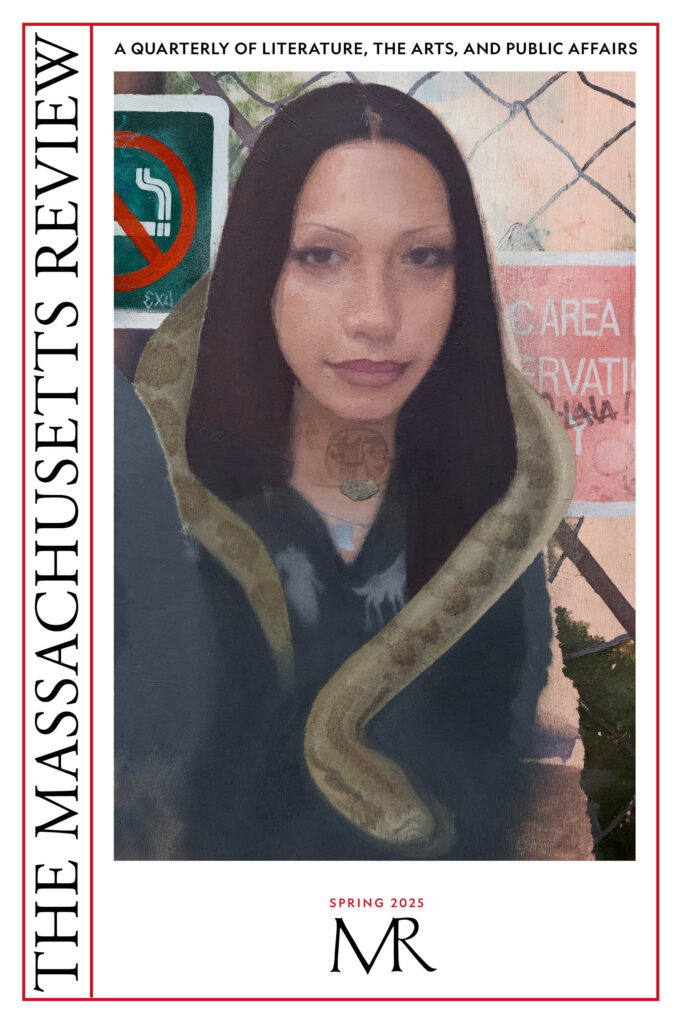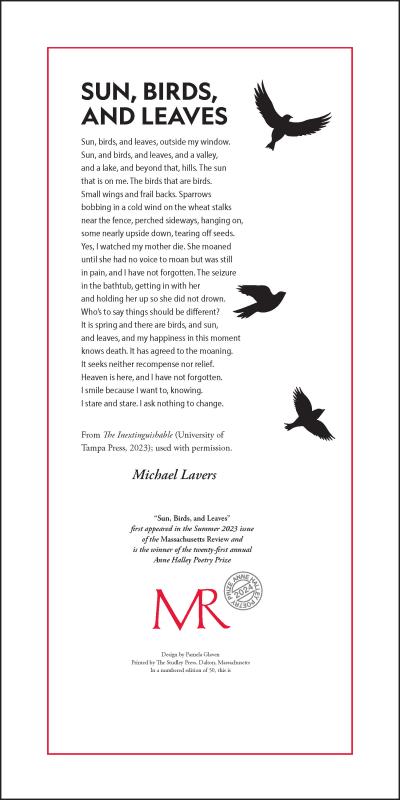Spring 2025 Out Now

OUR SPRING ISSUE opens with a reflection from Jim Hicks, who has led the Massachusetts Review for the past fifteen years with unwavering devotion. An exceptional ambassador, Jim’s enthusiasm for this magazine and for the people who make it possible is palpable to everyone in his orbit. Under his leadership, MR deepened its commitment to publishing literature in translation, established the Chametzky Prize for translation, and expanded its reach through the publication of a thriving blog and Working Titles e-books. Anyone who has worked with Jim also knows he is an incredibly generous reader, a thoughtful editor, and an all-around good person. One member of the editorial collective called him the “most elegant editor I’ve ever worked with.” While Jim is stepping down in his capacity as Executive Editor, we won’t let him go too far. Thanks for everything, Jim.
This issue goes to print just as Donald Trump is about to be inaugurated as the 47th president of the United States. The contributions that follow register ominous futures and catastrophic pasts, including the wreckages already made by a first Trump presidency. But they also contain glimmers of what’s possible even in the darkest of times. An opening set of poems crackle and burn their way to rebirth and renewal. Carolann Caviglia Madden’s “Shameproof” closes with “there is no growth without fire” and Anna Leahy’s “Artemisia Tridentata” leaves us with sagebrush’s purifying power: “Camphor clears the head; it clears the stench / of death. And when it burns, it burns fast.” Sejal Shah reminisces about her time as an MFA student with Jim Foley, sharing several moving memories along with his handwritten annotations on a story she wrote in the fiction workshop they took together. Shah notes, “Your writing. It’s one of the ways in which you live on.” Art by Michael Alvarez lends an ambient everydayness to the issue: a reminder that even in the middle of political turmoil and economic crisis, people continue to live their lives and do so in beautiful community with friends, family, neighbors, and, sometimes, complete strangers. Finally, we are thrilled to feature “Bertram Bracht Emerges from the Flood,” a new novella by the esteemed Argentinian-Chilean-American writer and playwright Ariel Dorfman.
This issue also marks my first as Executive Editor. I am overjoyed to be joining such a vibrant collective of editors and to be part of a publication that is unafraid of engaging society’s most pressing social, political, and economic issues. My goal is to honor MR’s legacies and strengths, especially its internationalism and its commitments to social justice, and to extend its vision in ways that are aligned with core values and principles. I am especially proud to be joining MR as it has just released its special issue on Gaza, and as it prepares to publish a special issue in winter 2025 on incarcerated writers and families. We will continue to do whatever we can to center voices confronting conditions of genocide, war, political repression, and state violence. It feels more necessary than ever to provide a platform for bold and brave writing speaking truth to power.
Britt Rusert
for the editors








